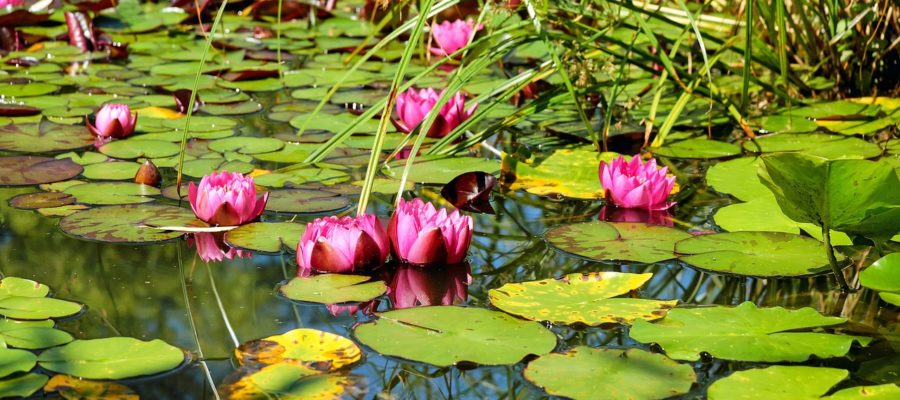Say what you like about the French—they certainly know how to build a palace. Anyone who has visited Versailles, especially if they were lucky enough to go when the fountains were in full play, will know how much the well-planned use of water adds to the experience of a garden. OK, you may not want to match the 1.3 million gallons a day that Versailles can offer, but a humble pond can be a great start.
Why Do You Want a Pond?
Before you make any plans, you need to be clear about why you want a pond. This will determine the size, cost, and location. If you want a quiet spot where you can retreat and contemplate nature, you will choose an undisturbed corner where wildlife may be attracted. If you want a dramatic statement to impress your visitors, it will need to be visible from everywhere. If you want to breed fish you will require plenty of sunlight. If you are a keen wild swimmer and want to bring your hobby into your own yard, you will obviously need a lot of space.
How Will You Build Your Pond?
Having determined where your pond is to be located and its approximate size, you need to determine whether the ground there is appropriate. It will cost you a lot if you have to blast through bedrock!
Decide how you will line your pond. Most people opt for a thick butyl rubber liner, flexible and strong. You really do not want to replace it anytime soon.
Determine how deep your pond will be. If it is mainly for effect it does not need to be too deep, but if you are hoping for a mixture of pond plants to colonize it, you will need several different depths to accommodate the preferences of different sorts of plant life. If you plan to have fish, it will need to be deep enough to offer protection from the cold and from predatory birds.
The edge of your pond requires almost as much planning as the pond itself. Make sure you have enough space around the pond to install the edging that you want.
How Will You Keep the Water Moving?
One thing that is essential to a healthy pond is to keep the water moving. Whether you are running it through a mechanical filter or relying on water weeds to do the filtration for you, the water needs to be pumped around constantly. You may want to look into the possibility of having a solar-powered pump if you have a suitable location.
Movement is also essential to the aeration of the water, on which most of the plant and animal life in the pond depends. A waterfall is a natural looking way to get oxygen into the water but involves very careful design to get it right. An alternative is to have a fixed or floating pond fountain which looks good and has a pleasing sound. Fountains also make the pond less attractive to algae and breeding insects.
When you are thinking about the fountain or waterfall, consider installing a variable power pump so that you can adapt its flow to the seasons or to your own special occasions. Also, consider any lighting you have in mind to make the most of the fountain’s effect.
How Will You Maintain Your Pond?
When your pond it built, your work is not over. If you are not prepared to lay out time and money on looking after the pond, then your initial investment will not have been well spent. It can sometimes seem that a small pond requires more maintenance than a big one because it doesn’t have the volume of water or the variety of plant life to look after itself.
Fish will, of course, need attention; the more exotic the fish, the more care they will require. If you want to encourage invertebrates and amphibians, you will still have to monitor the water quality to keep it at its best.
Filters will need to be cleaned regularly and replaced from time to time. You will probably be engaged in an endless war with algae, but an electronic controller along with your filter should help you to keep on top.
A Joy for Life
Looking after a pond can become a consuming and rewarding hobby. There is so much that happens on and under the surface and it will change with every season and every year. Start out in the right way and it will never fail to delight you.
Daniel Crackower is the owner of Living Water Aeration. He founded the business in 2004 and has been specializing in aeration and fountain equipment for ponds and lakes for over 13 years. Daniel has spoken to thousands of customers about ponds, encountering and finding solutions for virtually every kind of pond and water quality issue imaginable.


